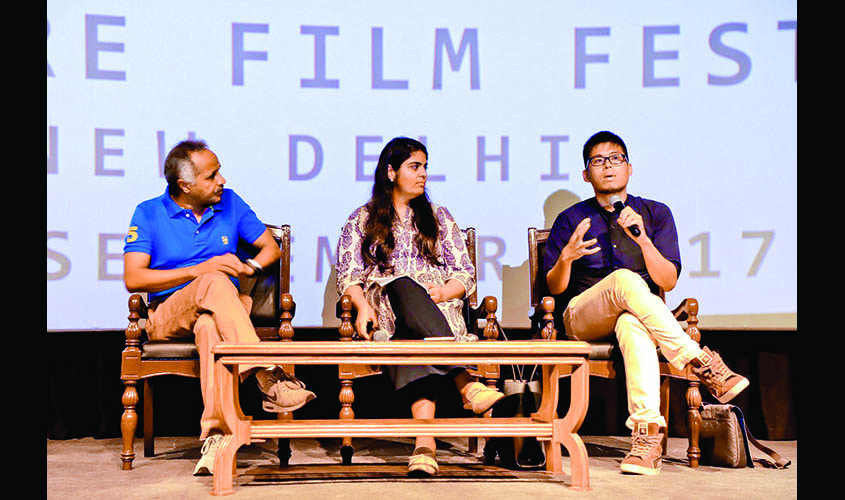Last week, Delhi’s Sirifort Auditorium hosted a three-day film festival centred on Singaporean cinema. The Singapore Film Festival, co-organised by the Singapore High Commission and the Directorate of Film Festivals, provided a platform to young Singaporean filmmakers looking to showcase their work for the Indian audiences. The high-point of the festival was a performance dedicated to “Xin Yao” (meaning, Singapore Songs in Mandarin), a unique genre of music by young Singaporeans endeavouring to revive a movement that took place back in the 1980s.
Speaking about the festival’s vision, Kester Tay, festival programmer and first secretary at the Singapore High Commission, said, “We started celebrating Singapore Film Festival on the occasion of the 50th Anniversary of Singapore. The purpose of the event is to promote a better understanding of Singapore’s culture in India. Renowned Indian filmmaker in Singapore, K. Rajogopal has tried to portray how an Indian creates his identity in Singapore, a society dominated by the Chinese. I hope that after watching these films the Indian audiences find out something different about Singapore. People should know that Singapore is more than a tourist spot. It is an attempt to make them familiar with Singapore’s culture and day-to-day life.”
Xin Yao was most talked about throughout the festival. Tay adds, “We are screening two films that were exhibited at Cannes last year, giving space to Singapore in international cinema. Another thing is Xin Yao, which was started in the 1980s by students who got together informally to play music and composed songs on their experiences. Singapore is going through a phase of economic progress that exerted pressure on students, demanding that they study instead of pursuing music. Therefore, Xin Yao became a way for them to express themselves. It became quite popular and it grew out of the college and started being commercialised. They launched albums whose songs were quite simple as they could be accompanied by any instrument. Its lyrics are very clean and easy to understand, so they are quite easy to relate to. These songs were forgotten for a while now. At this year’s festival, young artistes are giving a fresh start to these songs.”
A statement from the Directorate of Film Festivals read, “As Directorate of Film Festivals, we organise film festivals in collaboration with High commission/ embassies of the other countries as part of cultural exchange program. Earlier in this year, Directorate of Film Festivals had organised Indian Film Festival in collaboration with Indian High Commission in Singapore in partnership with the Office of Alumni Relations (OAR) and National University of Singapore in Singapore from 10-12 April.”
Day One commenced with the screening of That Girl in a Pinaforem, followed by a dialogue with director Yee Wei Chai and music producer Zennon Goh. The film tells the story of Jiaming, a free-spirited teenager who goes through a number of vicissitudes on the path to pursuing music. This was a film dedicated to Xin Yao.
Day Two began with a discussion between two filmmakers, Daljit Ami from India and Kang Sheng Tang from Singapore, who are part of the Singapore-India reciprocal filmmaker’s residency. They addressed the audiences and discussed their upcoming short film based on a documentary that revolved around the Singapore mutiny that took place back in 1915.
The second day also witnessed the screening of two highly-awaited films—A Yellow Bird and Apprentice—that were also showcased at the Cannes Film Festival 2016. The fully-packed auditorium vouched for the overall success of the event.
A Yellow Bird is based around a character called Siva, an Indian-Singaporean who is recently released from prison. The film shows different phases of struggle that he comes across while finding his daughter and wife. The film was outstanding as expected. This screening was followed by a talk by director K. Rajagopal. Rajagopal has won the Singapore International Film Festivals Special Jury Prize for three consecutive years
Day Three started with a short, The Songs We Sang, a documentary made as a tribute to “Xin Yao”. Post the show, the film’s music producer Zennon Goh also addressed the audience. The performance of Xin Yao songs by Zi Jian Tan was also highly appreciated. Jian is one of Singapore’s young, promising musicians who composes and performs his own songs.
The day ended with the screening of 7 Letters, a film that features seven shorts by different directors, all showcasing the story of their personal attachment to Singapore. The themes touch upon tales of lost love, identity, inter-generational familial bonds and tensions, unlikely neighbours, and traditional folklore. The seven short films included Cinema by Eric Khoo, That Girl by Jack Neo, The Flame by K. Rajogopal, Bunga Sayang (Flower of Love) by Royston Tan, Pineapple Town by Tan Pin, Parting by Boo Junfeng and Grandma Positioning System (GPS) by Kelvin Tong.

